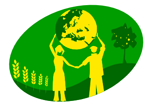Press release – Brussels 2 September 2014

On the 3rd September, in the meeting of the Milk Advisory Group, representatives from different European organisations who are members of the European Coordination of Via Campesina will request measures to ensure that that the Russian veto of EU dairy products, equivalent to 2,2000,000 tonnes of milk, does not cause a huge imbalance in the milk industry and disastrous prices for farmers.
From the ECVC we demand that market and production regulation measures be applied urgently, to avoid surpluses and low prices for agricultural products, such as meat and milk, which could happen as a result the Russian veto.
We believe that the CAP should orient itself fundamentally towards the production of healthy and accessible foods for the European population, within the framework of food sovereignty; with a production model under which ensures that throughout Europe thousands of small and medium-sized family farms have respectable wages, guarantees a living rural environment and generate jobs and wealth; for this reason, we propose that exports cease to be the main point of focus of the CAP, since they place our farmers in situations of great vulnerability, as is the case presently, fundamentally due to the geopolitical interests of international powers.
In this context we consider it hugely irresponsible to continue on this path of getting rid of regulatory instruments in the milk sector, such as the end of the milk quotas planned for April 2015, and continuing to encourage increases in production that worsen problems of overproduction and lower prices, at levels which also mean that farms are obliged to sell below the costs of production and thousands of milk producing farmers are going bankrupt throughout Europe.
We consider that the principle of community preference should be applied, to end the senselessness of policies which encourage the import of foods over thousands of kilometres, and even also at times the export of this same food again over thousands of kilometres, with negative impacts on the social agriculture and livestock model, the unnecessary consumption of energy, pollution, unstable prices…
The ECVC does not consider compensation or help through encouraging exports to be the answer, since this would mean that these products end up in developing countries at prices lower than the cost of production, causing the price of the exported products to crash in the countries of origin and destination.
In addition to continued monitoring of the milk sector situation by the Commission, it is essential to apply measures to maintain the income of farmers producing milk and other foods that are affected by the Russian veto, in such a way that through the crisis fund and other budgetary resources, the fall of prices paid to farms is compensated for. This is to avoid farms closing or going bankrupt, a reality that is irreversible when it happens, even more so due to the problem of the ageing European farmer population and the severe consequences of the abandonment of many rural areas.
Encouraging the conversion of perishable products such as milk, using processes that allow its preservation, and strengthening guidelines that guarantee the accessibiltiy of quality dairy products to needy individuals and groups who don’t have enough food or a balanced diet. Certainly, looking for different uses for the vetoed food products, with adequate prices for producers and consumers, and respecting the food sovereignty of different peoples.
Regulating production and the market to avoid negative consequences.
For more information:
· Isabel Vilalba–ECVC–SLG mobile +34 608905444 email: labregas@sindicatolabrego.com
· Press Contac t ECVC: marzia.rezzin@eurovia.org
